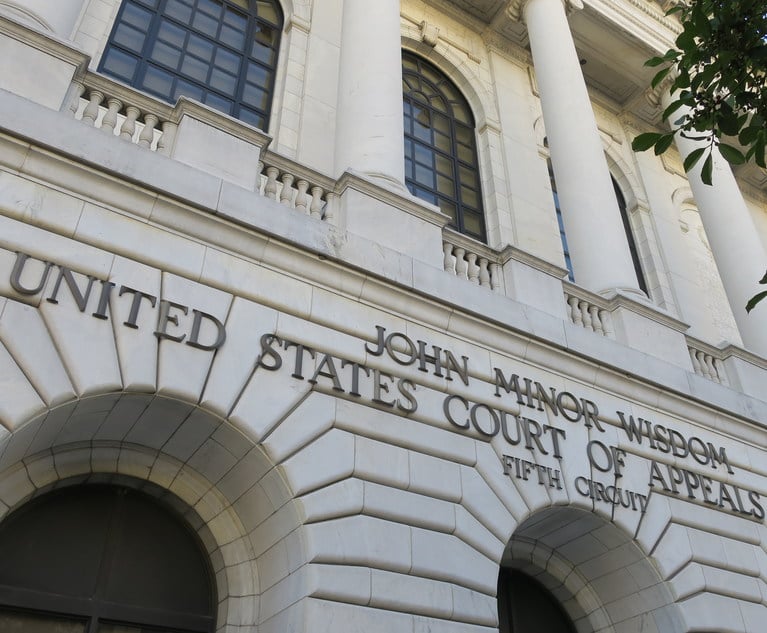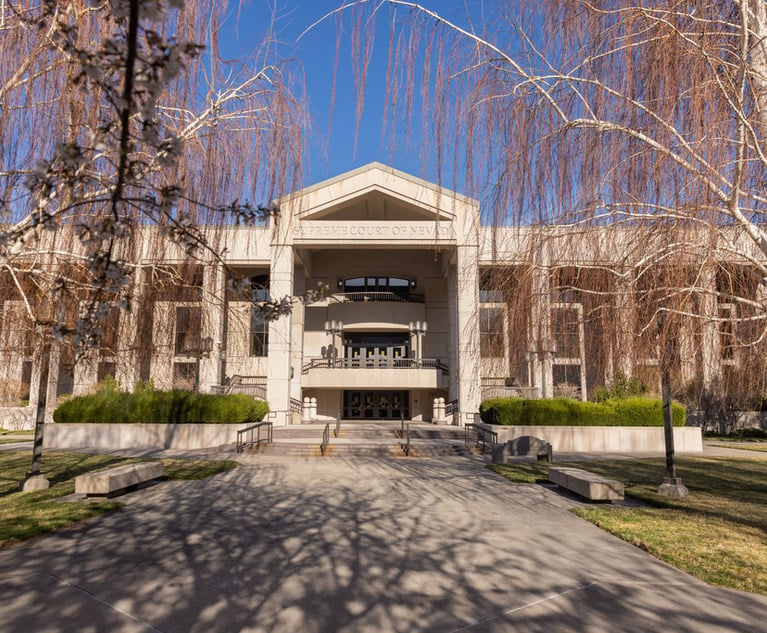 Photo: Diego M. Radzinschi/ALM
Photo: Diego M. Radzinschi/ALMGig Economy Plaintiffs Will Test-Drive New SCOTUS Ruling Against Arbitration
Plaintiffs and management-side lawyers will assess whether and how the U.S. Supreme Court's "New Prime" ruling can be applied to on-demand transportation workers.
February 12, 2019 at 02:32 PM
5 minute read
Gig economy companies such as Uber, GrubHub and Lyft will face renewed arguments against the arbitration agreements their drivers are forced to sign, as plaintiffs lawyers test the scope of a new U.S. Supreme Court ruling to keep cases in the courtroom.
The Supreme Court's unanimous decision in January in New Prime v. Oliveira clarified that an exemption for “transportation workers” in the Federal Arbitration Act applies to both independent contractors and employees who engage in interstate commerce.
The decision marked a rare strike against arbitration by the Supreme Court, which has issued rulings in recent years bolstering the power of employers and companies to stop workers and consumers from taking disputes to court.
Now, questions have surfaced about whether the New Prime ruling could be expanded to the gig economy, where companies that employ on-demand drivers have used arbitration agreements to stop disputes involving worker classification and wages from going to court.
Already in the weeks since the ruling was issued, there are signs plaintiffs lawyers will use the opinion to reinforce their arguments that drivers who signed arbitration agreements should nonetheless be allowed to sue their employers in court. The U.S. Chamber of Commerce warned the justices that “untold thousands of arbitration agreements would be called into question” if the court ruled for the truck drivers.
➤➤ Get employment law news and commentary straight to your inbox with Labor of Law, a new Law.com briefing. Learn more and sign up here.
A central question in many gig economy cases revolves around worker classification. Uber, Lyft and other companies consider their drivers to be contractors, working flexible schedules but not entitled to certain benefits and other labor rights accorded to employees.
“Many gig-economy companies to date have labeled their drivers 'independent contractors' in an attempt to avoid wage-and-hour and other employment laws. New Prime makes it clear they won't be able to use that label to force their drivers into arbitration,” Rick Bales, a professor at Ohio Northern University College of Law, said in a recent blog post.
On-demand companies are expected to argue that their drivers should not fall under the exemption for “transportation workers” such as truck drivers because they do not engage in “interstate commerce.” Trial and appeals courts will now look at whether and how often on-demand drivers can be considered participating in “interstate commerce.”
Shannon Liss-Riordan, a partner at Boston's Licthen & Liss-Riordan who has fought for on-demand drivers, said in an interview she has argued for years that drivers fighting to bring their claims to court should fall into the transportation worker exception. She has already alerted judges in pending cases to the New Prime decision.
Some cases in federal court were put on hold pending the New Prime decision. A case against Amazon.com Inc. on behalf of drivers was stayed until the decision was reached and Liss-Riordan alerted the court to the potential impact. She's also making the argument in a number of her cases on behalf of drivers for food delivery companies. These include a collective action against GrubHub in Chicago on behalf of 7,000 drivers, another against Postmates, now pending in the U.S. Court of Appeals for the Ninth Circuit, and another against DoorDash.
“The case just confirms we should be eligible for the exemption,” Liss-Riordan said. “We are entitled either way, but the New Prime decision is helpful because it clarifies the court does not need to decide whether the workers are employees.”
Domenique Camacho Moran, a labor and employment partner at Farrell Fritz in New York, said there is still uncertainty about whether gig economy drivers will fall under the exemption outlined in the FAA. “That's the million-dollar question,” she said.
Moran said it won't be an “easy argument” for companies such as Uber and Lyft to contend their drivers should not fall under the arbitration exemption for transportation workers.
“We are seeing now arbitration agreements may be a useful vehicle for resolving disputes expeditiously, but there may not be a wholesale rubber stamp,” Moran said.
Still, some state laws that govern arbitration disputes could limit the reach of the Supreme Court's decision.
“If the Federal Arbitration Act doesn't apply, state statutes or common law may still mandate arbitration of the dispute,” Moran said.
Fisher & Phillips partner Anderson Scott in Atlanta said he has yet to see any new cases that rely solely on New Prime.
The management-side law firm posted an advisory, co-written by Scott and Felix Digilov, noting commentary about whether gig economy companies should be worried. There's no immediate resolution, but “the evolution of the New Prime decision—and whether it bleeds into the gig economy—will be 'interesting.'”
This content has been archived. It is available through our partners, LexisNexis® and Bloomberg Law.
To view this content, please continue to their sites.
Not a Lexis Subscriber?
Subscribe Now
Not a Bloomberg Law Subscriber?
Subscribe Now
NOT FOR REPRINT
© 2025 ALM Global, LLC, All Rights Reserved. Request academic re-use from www.copyright.com. All other uses, submit a request to [email protected]. For more information visit Asset & Logo Licensing.
You Might Like
View All
Legal Issues to Watch in the US Appeals Courts in 2025

Second Circuit Upholds $5M Judgment Against Trump in E. Jean Carroll Case
4 minute read
Divided 5th Circuit Shoots Down Nasdaq Diversity Rules

Nevada Supreme Court to Decide Fate of Groundbreaking Contingency Cap Ballot Measure
5 minute readTrending Stories
- 1Restoring Trust in the Courts Starts in New York
- 2'Pull Back the Curtain': Ex-NFL Players Seek Discovery in Lawsuit Over League's Disability Plan
- 3Tensions Run High at Final Hearing Before Manhattan Congestion Pricing Takes Effect
- 4Improper Removal to Fed. Court Leads to $100K Bill for Blue Cross Blue Shield
- 5Michael Halpern, Beloved Key West Attorney, Dies at 72
Who Got The Work
Michael G. Bongiorno, Andrew Scott Dulberg and Elizabeth E. Driscoll from Wilmer Cutler Pickering Hale and Dorr have stepped in to represent Symbotic Inc., an A.I.-enabled technology platform that focuses on increasing supply chain efficiency, and other defendants in a pending shareholder derivative lawsuit. The case, filed Oct. 2 in Massachusetts District Court by the Brown Law Firm on behalf of Stephen Austen, accuses certain officers and directors of misleading investors in regard to Symbotic's potential for margin growth by failing to disclose that the company was not equipped to timely deploy its systems or manage expenses through project delays. The case, assigned to U.S. District Judge Nathaniel M. Gorton, is 1:24-cv-12522, Austen v. Cohen et al.
Who Got The Work
Edmund Polubinski and Marie Killmond of Davis Polk & Wardwell have entered appearances for data platform software development company MongoDB and other defendants in a pending shareholder derivative lawsuit. The action, filed Oct. 7 in New York Southern District Court by the Brown Law Firm, accuses the company's directors and/or officers of falsely expressing confidence in the company’s restructuring of its sales incentive plan and downplaying the severity of decreases in its upfront commitments. The case is 1:24-cv-07594, Roy v. Ittycheria et al.
Who Got The Work
Amy O. Bruchs and Kurt F. Ellison of Michael Best & Friedrich have entered appearances for Epic Systems Corp. in a pending employment discrimination lawsuit. The suit was filed Sept. 7 in Wisconsin Western District Court by Levine Eisberner LLC and Siri & Glimstad on behalf of a project manager who claims that he was wrongfully terminated after applying for a religious exemption to the defendant's COVID-19 vaccine mandate. The case, assigned to U.S. Magistrate Judge Anita Marie Boor, is 3:24-cv-00630, Secker, Nathan v. Epic Systems Corporation.
Who Got The Work
David X. Sullivan, Thomas J. Finn and Gregory A. Hall from McCarter & English have entered appearances for Sunrun Installation Services in a pending civil rights lawsuit. The complaint was filed Sept. 4 in Connecticut District Court by attorney Robert M. Berke on behalf of former employee George Edward Steins, who was arrested and charged with employing an unregistered home improvement salesperson. The complaint alleges that had Sunrun informed the Connecticut Department of Consumer Protection that the plaintiff's employment had ended in 2017 and that he no longer held Sunrun's home improvement contractor license, he would not have been hit with charges, which were dismissed in May 2024. The case, assigned to U.S. District Judge Jeffrey A. Meyer, is 3:24-cv-01423, Steins v. Sunrun, Inc. et al.
Who Got The Work
Greenberg Traurig shareholder Joshua L. Raskin has entered an appearance for boohoo.com UK Ltd. in a pending patent infringement lawsuit. The suit, filed Sept. 3 in Texas Eastern District Court by Rozier Hardt McDonough on behalf of Alto Dynamics, asserts five patents related to an online shopping platform. The case, assigned to U.S. District Judge Rodney Gilstrap, is 2:24-cv-00719, Alto Dynamics, LLC v. boohoo.com UK Limited.
Featured Firms
Law Offices of Gary Martin Hays & Associates, P.C.
(470) 294-1674
Law Offices of Mark E. Salomone
(857) 444-6468
Smith & Hassler
(713) 739-1250










